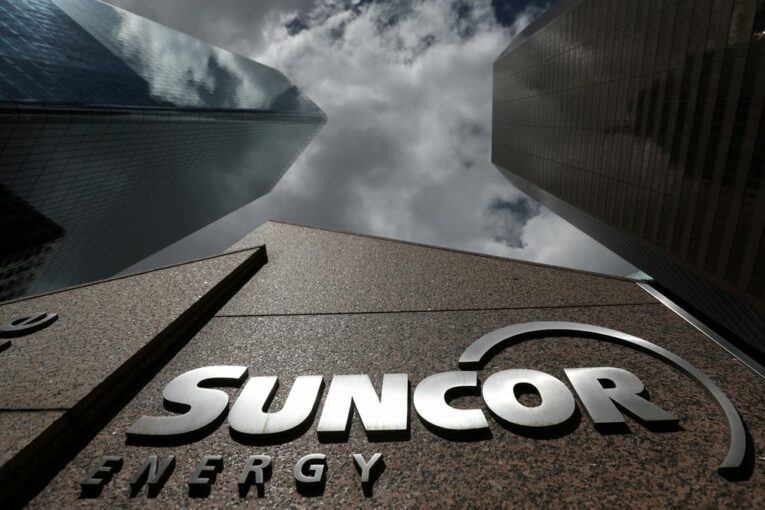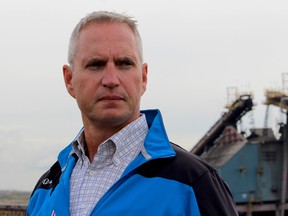
Suncor Energy Inc.’s chief executive said the energy giant “must do better” on worker safety and other operational challenges that cast a pall over a cash influx thanks to rising oil prices.
Chief executive Mark Little vowed to improve safety and operational problems at the Calgary-based oil producer and refiner after the recent death of a worker and incidents that stalled production at two sites in December.
“These outcomes are unacceptable and we know that we must do better,” Little said on a conference call Thursday.
A truck driver died in a collision at a company facility on Jan. 6, the fourth on-site fatality at Suncor since 2020, according to analysts at Bank of Nova Scotia. Suncor will implement collision avoidance and fatigue management technology to address safety issues, Little said, adding that Suncor will be the first oil sands company to adopt the technology commonly used in mining.
The company also plans to standardize safety processes across the company and implement technology
to improve productivity.
Suncor’s stock dipped about 3 per cent Thursday after the company reported fourth-quarter results that slightly missed analysts’ expectations.
Suncor revealed the operational difficulties earlier in January. Analysts questioned whether the company would turn its operations around after a couple years of “missteps,” and “lacklustre operational performance.”

National Bank analyst Travis Wood said in a January note that he “suspects major changes will be required to right the ship in regard to the company’s operational and safety culture.”
Despite the production snafus caused by faulty equipment and cold weather, Suncor swung to a profit of $1.55 billion in the three months ended Dec. 31, compared with a $168-million loss in the same period in 2020, a tumultuous year for oil companies thanks to depressed commodity prices and plummeting demand amidst the global pandemic.
Suncor credited the improved business environment for the swing in results. Oil prices started rallying to pre pandemic levels in 2021 and continue to rise amidst global tensions and an increase in demand.
Historically Canadian oil producers have used cash flow from price rallies to invest in new projects, but the industry’s largest players are currently focused on returning money to shareholders and improving existing operations. Suncor doubled its dividend in the fourth quarter and, earlier this week, Imperial Oil announced it would raise its dividend by 26 per cent.
Suncor emphasized plans to use the cash influx for share buybacks and debt repayment in 2022.
During the year it spent $2.3 billion on share buybacks, amounting to 5.5 per cent of its public shares. In 2022, it plans to buy back another 5 per cent of its public shares. It also paid down $3.7 billion of debt in 2021, bringing the total down to $16.1 billion, nearing its target range of $12 to $15 billion.
“Obviously the macro environment has changed a lot, everything is getting accelerated from debt repayments, share buybacks as well as the dividend,” Little said. “The faster we go on our debt metrics, the better chance we have at achieving further increases in dividends.”
Suncor is seeking buyers for its Norweigan assets and assessing market interest in its UK assets,
but will only pursue mergers and acquisitions if it makes “imminent sense” to shareholders, Little said. “We feel like our current portfolio of assets is complete, we don’t have any major gaps.”
Suncor’s revenue jumped to $11.1 billion from $6.6 billion. Adjusted funds from operations rose to $3.1 billion from $1.2 billion, breaking the company’s record from 2014, the last time oil prices soared.
Despite slightly lower quarterly production, which dipped to 743,000 barrels of oil equivalent per day from 769,000 in 2020, revenue increased to $11.1 billion from $6.6 billion. Adjusted funds from operations rose to $3.1 billion from $1.2 billion, a company record, Little said in a statement.
North American benchmark oil prices topped US$85 per barrel during the fourth quarter, boosting profits for producers and the Omicron coronavirus wave did not dent fuel demand as much as feared.
The oil producer used some of the cash to double its dividend to 42 cents per common share from 21 cents. During the year it also spent $2.3 billion on share buybacks, amounting to 5.5 per cent of its public shares, and $3.7 billion to pay down its debt.
Suncor intends to buy back another 5 per cent of its public shares in 2022. Suncor credited the improved business environment for the swing in results from 2020, the phase in the pandemic where the significant drop in demand for transportation fuel led to lower oil and gas prices.
You can read more of the news on source
